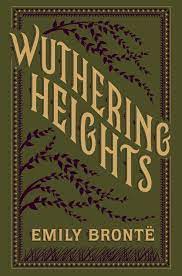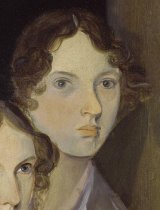Wuthering Heights Page #18
Wuthering Heights is an 1847 novel by Emily Brontë, initially published under the pseudonym Ellis Bell. It concerns two families of the landed gentry living on the West Yorkshire moors, the Earnshaws and the Lintons, and their turbulent relationships with Earnshaw's adopted son, Heathcliff.
“And the mistress?” I ventured to inquire; “the doctor says she’s—” “Damn the doctor!” he interrupted, reddening. “Frances is quite right: she’ll be perfectly well by this time next week. Are you going upstairs? will you tell her that I’ll come, if she’ll promise not to talk. I left her because she would not hold her tongue; and she must—tell her Mr. Kenneth says she must be quiet.” I delivered this message to Mrs. Earnshaw; she seemed in flighty spirits, and replied merrily, “I hardly spoke a word, Ellen, and there he has gone out twice, crying. Well, say I promise I won’t speak: but that does not bind me not to laugh at him!” Poor soul! Till within a week of her death that gay heart never failed her; and her husband persisted doggedly, nay, furiously, in affirming her health improved every day. When Kenneth warned him that his medicines were useless at that stage of the malady, and he needn’t put him to further expense by attending her, he retorted, “I know you need not—she’s well—she does not want any more attendance from you! She never was in a consumption. It was a fever; and it is gone: her pulse is as slow as mine now, and her cheek as cool.” He told his wife the same story, and she seemed to believe him; but one night, while leaning on his shoulder, in the act of saying she thought she should be able to get up to-morrow, a fit of coughing took her—a very slight one—he raised her in his arms; she put her two hands about his neck, her face changed, and she was dead. As the girl had anticipated, the child Hareton fell wholly into my hands. Mr. Earnshaw, provided he saw him healthy and never heard him cry, was contented, as far as regarded him. For himself, he grew desperate: his sorrow was of that kind that will not lament. He neither wept nor prayed; he cursed and defied: execrated God and man, and gave himself up to reckless dissipation. The servants could not bear his tyrannical and evil conduct long: Joseph and I were the only two that would stay. I had not the heart to leave my charge; and besides, you know, I had been his foster-sister, and excused his behaviour more readily than a stranger would. Joseph remained to hector over tenants and labourers; and because it was his vocation to be where he had plenty of wickedness to reprove. The master’s bad ways and bad companions formed a pretty example for Catherine and Heathcliff. His treatment of the latter was enough to make a fiend of a saint. And, truly, it appeared as if the lad were possessed of something diabolical at that period. He delighted to witness Hindley degrading himself past redemption; and became daily more notable for savage sullenness and ferocity. I could not half tell what an infernal house we had. The curate dropped calling, and nobody decent came near us, at last; unless Edgar Linton’s visits to Miss Cathy might be an exception. At fifteen she was the queen of the country-side; she had no peer; and she did turn out a haughty, headstrong creature! I own I did not like her, after infancy was past; and I vexed her frequently by trying to bring down her arrogance: she never took an aversion to me, though. She had a wondrous constancy to old attachments: even Heathcliff kept his hold on her affections unalterably; and young Linton, with all his superiority, found it difficult to make an equally deep impression. He was my late master: that is his portrait over the fireplace. It used to hang on one side, and his wife’s on the other; but hers has been removed, or else you might see something of what she was. Can you make that out? Mrs. Dean raised the candle, and I discerned a soft-featured face, exceedingly resembling the young lady at the Heights, but more pensive and amiable in expression. It formed a sweet picture. The long light hair curled slightly on the temples; the eyes were large and serious; the figure almost too graceful. I did not marvel how Catherine Earnshaw could forget her first friend for such an individual. I marvelled much how he, with a mind to correspond with his person, could fancy my idea of Catherine Earnshaw. “A very agreeable portrait,” I observed to the house-keeper. “Is it like?” “Yes,” she answered; “but he looked better when he was animated; that is his everyday countenance: he wanted spirit in general.” Catherine had kept up her acquaintance with the Lintons since her five-weeks’ residence among them; and as she had no temptation to show her rough side in their company, and had the sense to be ashamed of being rude where she experienced such invariable courtesy, she imposed unwittingly on the old lady and gentleman by her ingenious cordiality; gained the admiration of Isabella, and the heart and soul of her brother: acquisitions that flattered her from the first—for she was full of ambition—and led her to adopt a double character without exactly intending to deceive any one. In the place where she heard Heathcliff termed a “vulgar young ruffian,” and “worse than a brute,” she took care not to act like him; but at home she had small inclination to practise politeness that would only be laughed at, and restrain an unruly nature when it would bring her neither credit nor praise. Mr. Edgar seldom mustered courage to visit Wuthering Heights openly. He had a terror of Earnshaw’s reputation, and shrunk from encountering him; and yet he was always received with our best attempts at civility: the master himself avoided offending him, knowing why he came; and if he could not be gracious, kept out of the way. I rather think his appearance there was distasteful to Catherine; she was not artful, never played the coquette, and had evidently an objection to her two friends meeting at all; for when Heathcliff expressed contempt of Linton in his presence, she could not half coincide, as she did in his absence; and when Linton evinced disgust and antipathy to Heathcliff, she dared not treat his sentiments with indifference, as if depreciation of her playmate were of scarcely any consequence to her. I’ve had many a laugh at her perplexities and untold troubles, which she vainly strove to hide from my mockery. That sounds ill-natured: but she was so proud it became really impossible to pity her distresses, till she should be chastened into more humility. She did bring herself, finally, to confess, and to confide in me: there was not a soul else that she might fashion into an adviser. Mr. Hindley had gone from home one afternoon, and Heathcliff presumed to give himself a holiday on the strength of it. He had reached the age of sixteen then, I think, and without having bad features, or being deficient in intellect, he contrived to convey an impression of inward and outward repulsiveness that his present aspect retains no traces of. In the first place, he had by that time lost the benefit of his early education: continual hard work, begun soon and concluded late, had extinguished any curiosity he once possessed in pursuit of knowledge, and any love for books or learning. His childhood’s sense of superiority, instilled into him by the favours of old Mr. Earnshaw, was faded away. He struggled long to keep up an equality with Catherine in her studies, and yielded with poignant though silent regret: but he yielded completely; and there was no prevailing on him to take a step in the way of moving upward, when he found he must, necessarily, sink beneath his former level. Then personal appearance sympathised with mental deterioration: he acquired a slouching gait and ignoble look; his naturally reserved disposition was exaggerated into an almost idiotic excess of unsociable moroseness; and he took a grim pleasure, apparently, in exciting the aversion rather than the esteem of his few acquaintances.
Translation
Translate and read this book in other languages:
Select another language:
- - Select -
- 简体中文 (Chinese - Simplified)
- 繁體中文 (Chinese - Traditional)
- Español (Spanish)
- Esperanto (Esperanto)
- 日本語 (Japanese)
- Português (Portuguese)
- Deutsch (German)
- العربية (Arabic)
- Français (French)
- Русский (Russian)
- ಕನ್ನಡ (Kannada)
- 한국어 (Korean)
- עברית (Hebrew)
- Gaeilge (Irish)
- Українська (Ukrainian)
- اردو (Urdu)
- Magyar (Hungarian)
- मानक हिन्दी (Hindi)
- Indonesia (Indonesian)
- Italiano (Italian)
- தமிழ் (Tamil)
- Türkçe (Turkish)
- తెలుగు (Telugu)
- ภาษาไทย (Thai)
- Tiếng Việt (Vietnamese)
- Čeština (Czech)
- Polski (Polish)
- Bahasa Indonesia (Indonesian)
- Românește (Romanian)
- Nederlands (Dutch)
- Ελληνικά (Greek)
- Latinum (Latin)
- Svenska (Swedish)
- Dansk (Danish)
- Suomi (Finnish)
- فارسی (Persian)
- ייִדיש (Yiddish)
- հայերեն (Armenian)
- Norsk (Norwegian)
- English (English)
Citation
Use the citation below to add this book to your bibliography:
Style:MLAChicagoAPA
"Wuthering Heights Books." Literature.com. STANDS4 LLC, 2025. Web. 17 Jan. 2025. <https://www.literature.com/book/wuthering_heights_1627>.




Discuss this Wuthering Heights book with the community:
Report Comment
We're doing our best to make sure our content is useful, accurate and safe.
If by any chance you spot an inappropriate comment while navigating through our website please use this form to let us know, and we'll take care of it shortly.
Attachment
You need to be logged in to favorite.
Log In